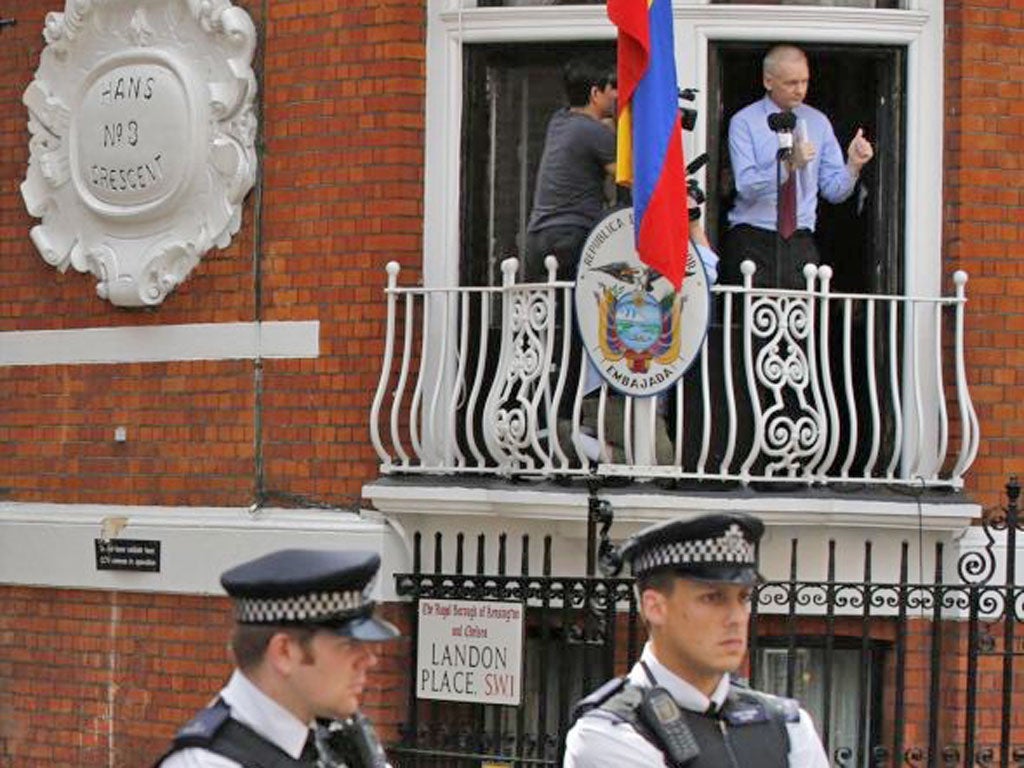Julian Assange supporters ordered to hand over £93,500 after he skipped bail by seeking refuge in the Ecuadorean Embassy

Supporters of Julian Assange who provided sureties for the Wikileaks founder were ordered to hand over £93,500 after he skipped bail by seeking refuge in the Ecuadorean Embassy in London.
Nine backers – including a Nobel prize winning biologist, the wife of a Labour peer and a leading journalist – were told they must each pay between £3500 and £15000 by next month.
Chief Magistrate Howard Riddle praised the “admirable” motivations of the nine and said he accepted that the sums could have an impact on the financial wellbeing of some of them – including Professor Tricia David, who was now retired. He reduced the total amount the group were ordered to pay from £140,000 to £93,500 to reflect this.
“They have acted on their beliefs and principles throughout,” Mr Riddle said. “In what is sometimes considered to be a selfish age, that is admirable.”
Other Assange supporters including Jemima Khan and filmmaker Ken Loach have already lost £200,000 after paying money into court following the 2010 extradition proceedings against Mr Assange who faces a European arrest warrant in connection with allegations of sex crimes in Sweden.
Mr Assange, whose Wikileaks website published thousands of sensitive diplomatic and military cables, has been holed up in Ecuador’s London embassy since June.
He claims that if he travels to Sweden he could face further extradition to the United States – possibly even being sent to Guantanamo Bay - over the publication of the documents which Washington claimed put service and diplomatic personnel in danger.
Vaughan Smith, a former British Army captain and journalist who volunteered to let Mr Assange stay at his Suffolk home when he was first granted bail, was ordered to pay £12,000 of an original £20,000, told The Independent the backers continued to believe they had acted properly in putting up the money.
He said five of the group had visited Mr Assange last week and while he was grateful for their support and upset at their potential financial loss, they were unable to influence him to leave the embassy.
They accepted that his human rights might be flouted should he be sent to the US to face a legal process over the Wikileaks revelations.
“It is a situation where my family will live a little less well but at least we believe we have done the right thing and will be able to live with ourselves,” Mr Smith added.
The backers, who had been receiving pro-bono legal representation so far, are unlikely to appeal because against the decision because they would face the prospect of high court costs should they lose.
Professor Tricia David, Caroline Evans, Joseph Farrell, Sarah Harrison, Phillip Knightley, Sarah Saunders, John Sulston, Tracy Worcester and Mr Smith must pay up by 6 November.
Mr Riddle said he had taken account of the means of the nine, adding: “Professor David is a pensioner and the sum of £20,000 comprises a substantial portion of her savings jointly with her husband.
“Sarah Saunders has also provided details of her financial position and I am satisfied that she is of comparatively limited means. Mr Vaughan Smith tells me that if he forfeits the £20,000 surety it will have a significant impact on the welfare of his family and his employees. Having seen and heard from the sureties, I cannot avoid taking some account of their integrity.
“I approach this decision on the basis that I should forfeit no more than is necessary, in public policy, to maintain the integrity and confidence of the system of taking sureties so that a person may be released on bail.”
Author and investigative journalist Phillip Knightley urged the British Government to enter into negotiations with the Ecuadorians over the future of Mr Assange. He said he accepted the court’s decision but was saddened by the outcome.”I would do the same thing again,” he added.
